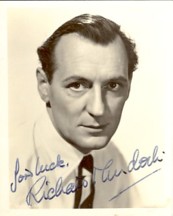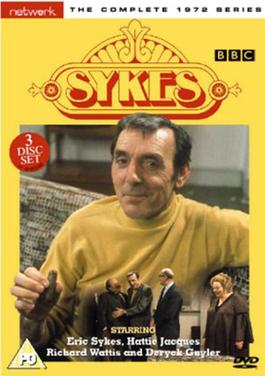
Deryck Bower Guyler was an English actor, best remembered for his portrayal of officious, short-tempered middle-aged men in sitcoms such as Please Sir! and Sykes.

Richard Bernard Murdoch was an English actor and entertainer.

Sykes is a British sitcom that aired on BBC 1 from 1972 to 1979. Starring Eric Sykes and Hattie Jacques, it was written by Sykes, who had previously starred with Jacques in Sykes and a... (1960–1965) and Sykes and a Big, Big Show (1971). Forty-three of the 1970s colour episodes were remakes of scripts for the 1960s black and white series, such as "Bus" based on 'Sykes and a Following' from 1964 and the episode "Stranger" with Peter Sellers based on 'Sykes and a Stranger' from 1961.
Esmonde and Larbey were a British television screenwriting duo, consisting of John Gilbert Esmonde and Robert Edward Larbey, who created popular sitcoms starting from the mid-1960s until the mid-1990s such as Please Sir!, The Good Life, Get Some In!, Ever Decreasing Circles, and Brush Strokes.

Robert Renwick Mortimer is an English comedian, author, television presenter and actor. He is known for his work with Vic Reeves as part of their Vic and Bob double act, and more recently the Mortimer & Whitehouse: Gone Fishing series with Paul Whitehouse. He has also appeared on panel shows such as Would I Lie to You? and Taskmaster.
The Man Born to Be King is a radio drama based on the life of Jesus, produced and broadcast by the BBC during the Second World War. It is a play cycle consisting of twelve plays depicting specific periods in Jesus' life, from the events surrounding his birth to his death and resurrection. It was first broadcast by the BBC Home Service on Sunday evenings, beginning on 21 December 1941, with new episodes broadcast at 4-week intervals, ending on 18 October 1942. The series was written by novelist and dramatist Dorothy L. Sayers, and produced by Val Gielgud, with Robert Speaight as Jesus.

Roy Dotrice was a British actor. He played the antiquarian John Aubrey in the solo play Brief Lives. He won a Tony Award for his performance in the 2000 Broadway revival of A Moon for the Misbegotten, also appearing as Wolfgang Amadeus Mozart's father Leopold in Amadeus (1984), Charles Dickens in Dickens of London (1984), and Jacob Wells/Father in Beauty and the Beast.

Who Do You Think You Are? is a British genealogy documentary series that has aired on the BBC since 2004, in which celebrity participants trace their family history. It is made by the production company Wall to Wall. The programme has regularly attracted an audience of more than 6 million viewers. More than ten international adaptations of the programme have been produced.

Wilfrid Hyde-White was a British character actor of stage, film and television. He achieved international recognition for his role as Colonel Pickering in the film version of the musical My Fair Lady (1964).

Much-Binding-in-the-Marsh was a comedy show broadcast from 1944 to 1950 and 1951 to 1954 by BBC radio and in 1950–51 by Radio Luxembourg. It was written by and starred Richard Murdoch and Kenneth Horne as officers in a fictional RAF station coping with red tape and the inconveniences and incongruities of life in the Second World War. After the war the station became a country club and finally the show became the chronicle of a newspaper, The Weekly Bind.
Hilda Tablet is a fictitious "twelve-tone composeress" created by Henry Reed in a series of radio comedy plays for the British Broadcasting Corporation's Third Programme. Hilda is the inventor of musique concrète renforcée, and the composer of the all-female opera Emily Butter set in a department store.
Springbok Radio was a South African nationwide radio station that operated from 1950 to 1986.

Please Sir! is a British television sitcom created by John Esmonde and Bob Larbey and featuring actors John Alderton, Deryck Guyler, Penny Spencer, Joan Sanderson, Noel Howlett, Erik Chitty and Richard Davies. Produced by London Weekend Television for ITV, the series ran for 55 episodes between 1968 and 1972.

Sykes and a... is a black-and-white British sitcom starring Eric Sykes and Hattie Jacques that aired on BBC 1 from 1960 to 1965. It was written by Eric Sykes, Johnny Speight, John Antrobus and Spike Milligan. Sykes and a... was the first television series to feature both Sykes and Jacques, who later starred in Sykes and a Big, Big Show and Sykes, the latter of which featured the same characters and reused some of the same scripts.
The Plank is a 30-minute, British slapstick comedy film for television from 1979, which was written and directed by Eric Sykes. This version, which is a remake of the 1967 film The Plank, also written and directed by Sykes, was produced by Thames Television and broadcast on the ITV network.

Upstairs Downstairs is a British drama series, broadcast on BBC One from 2010 to 2012, and co-produced by BBC Wales and Masterpiece. Created and written by Heidi Thomas, it is a continuation of the London Weekend Television series of the same name, which ran from 1971 to 1975 on ITV.

Dickensian is a British drama television series that premiered on BBC One from 26 December 2015 to 21 February 2016. The 20-part series, created and co-written by Tony Jordan, brings characters from many Charles Dickens novels together in one Victorian London neighbourhood, as Inspector Bucket investigates the murder of Ebenezer Scrooge's partner Jacob Marley.
Ronald Baddiley was an English actor. He was best known for his roles in the early days of the long-running British radio drama The Archers, and as Under-Secretary, Sir Gregory Pitkin, CBE in the BBC comedy The Men from the Ministry.
Room at the Bottom is a British comedy television series which originally aired as a pilot in 1966 on the Comedy Playhouse and a single series of seven episodes on BBC 1 the following year. Set in the maintenance department of a large company tower block, it was the first sitcom by the writing team of John Esmonde and Bob Larbey. All episodes from this series are currently believed to be lost due to wiping.











